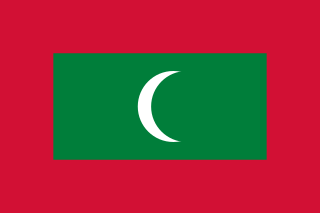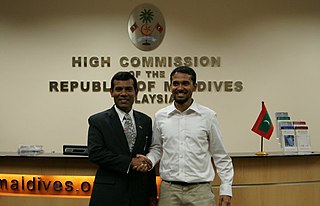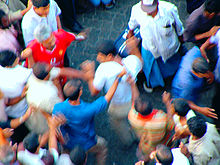
The Maldives, officially the Republic of Maldives, is a country and archipelagic state in South Asia in the Indian Ocean. The Maldives is named after the main island and capital of Male. The word "Maldives" means "the islands (dives) of Male". The name may derive from the Sanskrit word "maladvipa" meaning "garland of islands". Dhivehi Raajje in Dhivehi means "Kingdom of the Dhivehi people". The Maldives is southwest of Sri Lanka and India, about 750 kilometres from the Asian continent's mainland. The Maldives' chain of 26 atolls stretches across the equator from Ihavandhippolhu Atoll in the north to Addu Atoll in the south.

The history of the Maldives is intertwined with the history of the broader Indian subcontinent and the surrounding regions, comprising the areas of South Asia and Indian Ocean; and the modern nation consisting of 26 natural atolls, comprising 1194 islands. Historically, the Maldives had a strategic importance because of its location on the major marine routes of the Indian Ocean. The Maldives' nearest neighbours are the British Indian Ocean Territory, Sri Lanka and India. The United Kingdom, Sri Lanka and some Indian kingdoms have had cultural and economic ties with the Maldives for centuries. In addition to these countries, Maldivians also traded with Aceh and many other kingdoms in, what is today, Indonesia and Malaysia. The Maldives provided the main source of cowrie shells, then used as a currency throughout Asia and parts of the East African coast. Most probably Maldives were influenced by Kalingas of ancient India who were earliest sea traders to Sri Lanka and the Maldives from India and were responsible for the spread of Buddhism. Stashes of Chinese crockery found buried in various locations in the Maldives also show that there was direct or indirect trade contact between China and the Maldives. In 1411 and 1430, the Chinese admiral Zheng He 鄭和 visited the Maldives. The Chinese also became the first country to establish a diplomatic office in the Maldives, when the Chinese nationalist government based in Taipei opened an embassy in Malé in 1966. This office has since been replaced by the embassy of the People's Republic of China.
The politics of the Maldives take place in the framework of a presidential representative democratic republic, whereby the President is the Head of Government. Executive power is exercised by the government. The President heads the executive branch and appoints the Cabinet; like many presidential democracies, each member of the cabinet need to be approved by the Parliament. The President, along with their pick for vice president, is directly elected by the denizens to a five-year term by a secret ballot. Once in office, they could be re-elected to a second 5-year term, which is the limit allowed by the Constitution. The current President of the Maldives is Mohamed Muizzu, when his predecessor, Ibrahim Mohamed Solih lost the 2023 Maldivian presidential election. Nasheed reportedly resigned involuntarily to forestall an escalation of violence, and was placed in jail, before being forced into exile, from which he eventually returned.

President Uz.Maumoon Abdul Gayoom is an Islamic Scholar and a Maldivian politician who served as President of the Maldives from 1978 to 2008. After serving as transport minister, he was nominated president by the People's Majlis and succeeded Ibrahim Nasir in 1978. He was defeated in 2008 during the first Presidential Elections after democratic reforms in the Maldives. He holds the nations highest award, "The Most Honourable Order of Distinguished Rule of Ghaazee", presented to him in 2013. Maumoon was the longest-serving president in Asia.

The Maldivian Democratic Party is the first political party formed in the Republic of Maldives with a total membership of 57,660 individuals as of 11 February 2023. As of 2023 the party is the current governing party in the Maldives, after having secured safe majorities in both the presidency and parliament in 2018 and 2019. 2019 was the first time one party was able to secure a majority in parliament without forming a coalition.

Mohamed Nasheed GCSK, also known as Anni, is a Maldivian politician and activist who served as president of the Maldives from 2008 until his resignation in 2012. A founding member of the Maldivian Democratic Party, he subsequently served as the 19th speaker of the People's Majlis from May 2019 until his resignation in November 2023. He is the first democratically elected president of the Maldives and the only president to resign from office. He is currently a member of The Democrats.

Hassan Saeed was Attorney General of the Republic of Maldives from November 11, 2003, to August 5, 2007. He is the current managing partner of Chambers Inn and the Managing Director of Premier Property Pvt Ltd.

Ahmed Shaheed is a Maldivian diplomat, politician and professor. On 24 March 2016, he was appointed for the sixth year running as the United Nations Special Rapporteur on the human rights situation in the Islamic Republic of Iran. Shaheed is also the Chairperson of the Geneva-based international human rights think-tank, Universal Rights Group, which was launched in January 2014. He now lives in England, as Visiting Professor of Human Rights Practice at the University of Essex.

Muad Mohamed Zaki is one of the founders of the Maldives multi-party democratic system. His from a prominent left-wing political and business family in the Maldives. He migrated to Malaysia with his family in the 1990s after political turmoil in the Maldives that temporarily drove out large private business owners from the country. His father, Dato' Mohamed Zaki, is a highly respected figure in the Maldives by presidents and other political figures. The family owns a well-known multinational firm named Nazaki Group of Companies, which pioneered international trade between Malaysia and the Maldives.
The 2008 Constitution of Maldives designates Sunni Islam as the state religion. Only Sunni Muslims are allowed to hold citizenship in the country and citizens may practice Sunni Islam only. Non-Muslim citizens of other nations can practice their faith only in private and are barred from evangelizing or propagating their faith. All residents are required to teach their children the Muslim faith. The president, ministers, parliamentarians, and chiefs of the atolls are required to be Sunni Muslims. Government regulations are based on Islamic law. Only certified Muslim scholars can give fatawa.

The Progressive Party of Maldives, also known by its abbreviationPPM, is an Islamist political party in the Maldives with a total membership of 38,704 as of 21 February 2023. The stated goal of the party is driving Maldives towards an independent and democratic, safe and secure, high income, high human capital, developed nation state with a diversified and robust economy whilst preserving its Islamic heritage.
Ismail Khilath Rasheed is a Maldivian blogger known for his support of religious tolerance and his involvement in several national controversies. Reporters Without Borders has described him as a "leading journalist" and "one of his country’s leading free speech advocates".
The Maldives ranks from the middle to the top third of international indexes of press freedom, indicating a large degree of freedom. Media discussion of religion, however, remains tightly restricted.
Judge Abdulla Mohamed is the Chief Judge of the Criminal Court of the Maldives. In January 2012 he was arrested after releasing a government critic. After popular and judicial protests, he was freed and President Mohamed Nasheed resigned.

Presidential elections were held in the Maldives on 7, 9 and 16 November 2013. The first round was held on 7 September. As no candidate received a majority, a second round was planned to be held in 28 September between the candidates who received the most votes in the first round, former President Mohamed Nasheed and Abdulla Yameen, paternal half-brother of former president Maumoon Abdul Gayoom. Incumbent President Mohammed Waheed Hassan was eliminated in the first round after receiving less votes than three other candidates.
The 2011–2013 Maldives political crisis began as a series of peaceful protests that broke out in the Maldives on 1 May 2011. They would continue, eventually escalating into the resignation of President Mohamed Nasheed in disputed circumstances in February 2012. Demonstrators were protesting what they considered the government's mismanagement of the economy and were calling for the ouster of President Nasheed. The main political opposition party in the country, the Dhivehi Rayyithunge Party led by the former president of the country Maumoon Abdul Gayoom accused President Nasheed of "talking about democracy but not putting it into practice." The protests occurred during the Arab Spring.

Husnu Al Suood born in Meedhoo is a Justice of the Supreme Court of the Republic of Maldives since 8 December 2019. He was the Attorney General of the Maldives from June 2009 to August 2010. He served as the Chief Judge of the Civil Court and as a member of the Judicial Service Commission of Maldives. He also served as a member of the National Human Rights Commission of the Maldives from 2003 to 2005. As a member of the Special Majlis Suood participated in drafting the current constitution of the Republic of Maldives.

Abdulla Yameen Abdul Gayoom is a Maldivian politician who served as president of the Maldives from 2013 to 2018.

Maafushi Prison is a prison in Maafushi on Kaafu Atoll in the Maldives, 18 miles (29 km) south of the capital, Malé. It is the largest prison on the islands and has held numerous political prisoners over the years, including the former president, Mohamed Nasheed and former president Abdulla Yameen.

The Maldivian diaspora refers to the community of Maldivians, speakers of the Maldivian language, who have either emigrated from the Republic of Maldives or grew up outside of the Maldives speaking Dhivehi as a first language. The Republic of Maldives is a South Asian country geographically located in the Indian Ocean and Arabian Sea. Maldivians have historically emigrated from the Maldives for numerous reasons including low economic opportunity, political repression and education. India and Sri Lanka currently host the most Maldivians living outside of the Maldives, but other diaspora communities can be found in Malaysia, Singapore, Pakistan, and Australia.














